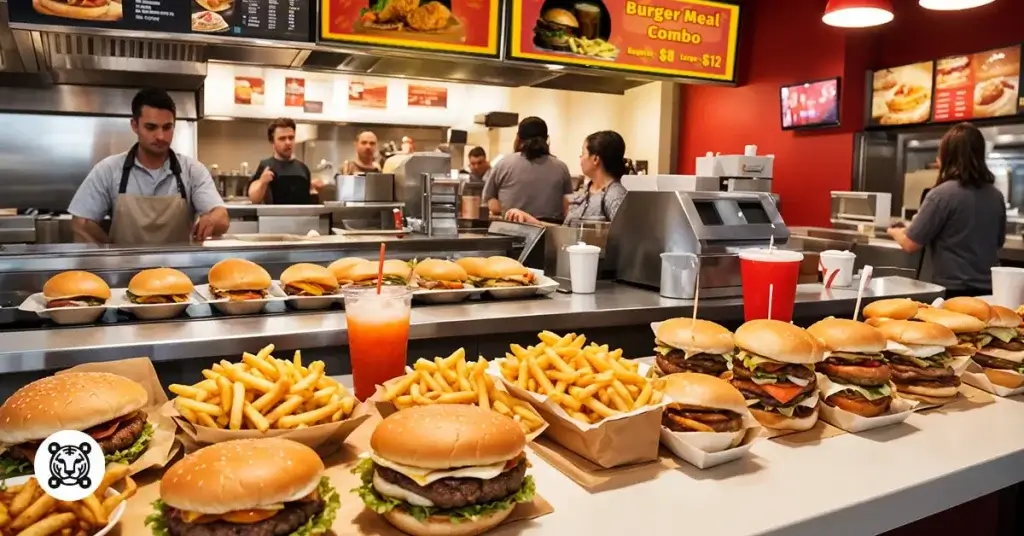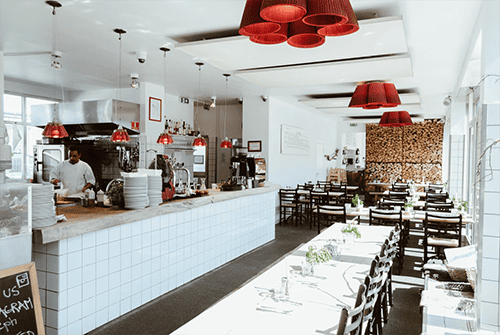Dining Thrills: Explore Cutting-edge Restaurants Transforming the Food Scene
The modern dining landscape is experiencing an exceptional transformation, noted by cutting-edge dining establishments that are redefining culinary standards. From the surge of pop-up establishments embracing seasonal ingredients to immersive experiences that involve the senses in extraordinary ways, these places are setting new standards of what it suggests to enjoy a dish. Additionally, an expanding emphasis on sustainability and regional sourcing reflects a dedication to both high quality and community. As we check out these fads, the concern emerges: what future advancements might better reshape our cooking experiences?
The Rise of Pop-Up Restaurants
As the cooking landscape advances, pop-up restaurants have become a dynamic force, captivating food lovers and entrepreneurs alike. These short-lived eating facilities, frequently established in unique rooms, offer an unique mix of imagination and ease of access, attracting a diverse variety of customers. The rise of pop-up restaurants can be associated to several aspects, including the growing need for novel eating experiences and the entrepreneurial spirit of cooks keen to test their cooking ideas without the financial burden of an irreversible location.Pop-up restaurants enable chefs to trying out menus, styles, and themes, commonly concentrating on seasonal or locally-sourced active ingredients. This versatility not only fosters development however likewise develops a feeling of necessity, as clients are attracted to the limited-time offerings. The ephemeral nature of pop-ups cultivates a buzz around the eating experience, urging social media sites sharing and word-of-mouth promotion, which can greatly boost presence and draw in a dedicated following.Furthermore, pop-up dining establishments often accommodate specific niche markets, ranging from vegan and gluten-free choices to ethnic foods, therefore meeting the varied nutritional preferences of contemporary consumers. Consequently, these facilities add to the rich tapestry of the food scene, pressing boundaries and challenging traditional notions of dining.
Immersive Dining Experiences

Lasting Practices in Food
Embracing sustainability, ingenious dining establishments are redefining their cooking techniques to minimize environmental impact while improving the dining experience. These facilities prioritize regional sourcing, often teaming up with neighboring farmers and producers to assure that ingredients are fresh and seasonal. This not only lowers the carbon impact connected with long-distance transportation yet likewise supports local economies.In addition to sourcing, dining establishments are significantly taking on practices that minimize waste. Many are carrying out composting systems and utilizing food scraps artistically, transforming what would typically be discarded into tasty elements of brand-new meals. For instance, vegetable trimmings can locate new life in supplies or garnishes, while stale bread is repurposed into croutons or bread puddings.Moreover, the trend in the direction of plant-based menus is acquiring momentum (Restaurants). By highlighting veggies, grains, and vegetables, restaurants can substantially reduce their ecological effect, as plant-based foods normally require fewer sources and create less greenhouse gas exhausts contrasted to meat production. Cutting-edge chefs are crafting meals that not just celebrate these active ingredients yet additionally offer diners with an extraordinary culinary experience.Furthermore, numerous establishments are embracing green methods such as using eco-friendly product packaging for takeout and investing in energy-efficient home appliances. These actions mirror a dedication to sustainability at every level of procedure, allowing restaurants to enjoy their dishes with the knowledge that their options add to a healthier world. As the food scene remains to evolve, the combination of sustainable methods comes to be not just a pattern, yet a necessary standard for the future of dining
Tech-Enhanced Dining Adventures
Tech-enhanced dining journeys are reinventing the means customers experience dishes, with over 70% of dining establishments now integrating digital advancements to raise service and involvement. These improvements are not merely fads; they are fundamental shifts that redefine the cooking landscape. From the moment diners enter a restaurant, modern technology is perfectly woven into the experience, enhancing both comfort and enjoyment.One of the most noteworthy innovations is using mobile applications for reservations and menu browsing. Restaurants can currently watch thorough descriptions, nutritional info, and also the origins of components at their fingertips. This transparency fosters informed selections and allows visitors to tailor their dining experience to their preferences.Furthermore, interactive tables outfitted with touchscreens provide an appealing platform for buying and enjoyment. Diners can personalize their meals, check out a glass of wine pairings, and even play games while waiting on their meals. This combination of innovation not just simplifies the ordering procedure yet also turns eating right into a dynamic, communal activity.Moreover, some facilities are using increased truth (AR) to develop immersive eating experiences. By merely directing a mobile phone at a recipe, patrons can envision the ingredients and cooking methods in an appealing way, linking the gap in between the cooking and electronic worlds.As dining establishments proceed to welcome these technical advancements, the dining experience becomes significantly individualized, efficient, and important link satisfying. This makeover shows a more comprehensive trend in the direction of boosting customer interaction, guaranteeing that each dish is not almost nutrition, however an unforgettable adventure in dining.
International Flavors With a Spin
The cooking landscape is significantly marked by blend cuisine innovations that blend traditional flavors with unexpected elements - Best Restaurants. Distinct component pairings not just improve the dining experience yet also pay tribute to cultural heritage, reimagining precious dishes in exciting new ways (Eddie's Rise N' Dine Williamsville IL). This creative method welcomes diners to check out varied global influences while experiencing acquainted preferences in a fresh context
Combination Food Innovations
Creative thinking in the cookeries has actually caused a lively rebirth of blend food, where chefs mix diverse global tastes to create ingenious dishes that resist traditional limits. This cooking motion goes beyond mere combination, concentrating on the unified combination of ingredients and techniques from various cultures.Restaurants specializing in fusion cuisine are redefining eating experiences by offering dishes that inform a story through taste, method, and discussion. The marital relationship of Japanese sushi with Peruvian ceviche has actually resulted in distinct rolls that celebrate both cooking heritages. Similarly, Indian flavors have located their method into Italian pasta recipes, supplying a fascinating twist on timeless recipes.Chefs are likewise experimenting with cooking techniques, such as using standard frying pan strategies to prepare Latin American stir-fries, thereby developing an abundant tapestry of tastes and structures. Seasonal schedule of ingredients further boosts this innovative procedure, enabling fresh analyses of classic meals. The appeal of fusion cuisine lies in its capability to shock and joy the palate, urging restaurants to discover brand-new culinary landscapes while fostering a higher appreciation for the variety of global gastronomy.
Distinct Active Ingredient Pairings
Culinary innovation commonly grows on the unexpected, and distinct component pairings are at the leading edge of this trend in the modern-day eating landscape. Cooks are significantly explore mixes that surprise and delight the taste buds, boosting the dining experience past conventional boundaries.For instance, the juxtaposition of wonderful and mouthwatering has actually become a trademark of contemporary food. Restaurants Near Me. Think of crispy duck offered with a cherry and balsamic glaze, where the tartness of the cherries matches the richness of the meat. Likewise, meals featuring miso-infused delicious chocolate desserts showcase exactly how umami can enhance sweetness, producing a balanced flavor profile that intrigues diners.Furthermore, using unique seasonings in unanticipated contexts, such as saffron in a traditional risotto coupled with lemon enthusiasm, highlights just how culinary boundaries can be redefined. These ingenious pairings not just produce visual and textural contrasts yet also invite diners to explore a spectrum of worldwide tastes in a solitary dish.As dining establishments remain to press the envelope, the thrill of finding new tastes through one-of-a-kind component pairings promises to be a specifying attribute of the modern-day food scene, welcoming adventurous eaters to enjoy these imaginative cooking discussions
Cultural Heritage Reimagined

The Art of Multi-Sensory Meals
In the domain name of cooking advancement, multi-sensory dishes are transforming the dining experience by intertwining taste and scent in bewitching methods. The effect of aesthetic discussion improves not just the aesthetic charm however additionally the perception of taste, while thoroughly curated soundscapes raise the ambiance. Together, these components produce an alternative experience that involves all detects, changing how clients get in touch with food.
Flavor and Fragrance Blend
An expanding number of chefs are welcoming the idea of taste and aroma blend, acknowledging that a dish is not simply a combination of components however an all natural experience that involves all the detects. This ingenious technique highlights the elaborate relationship in between taste and smell, both of which greatly influence our understanding of food.Chefs are experimenting with numerous techniques to enhance tastes while concurrently crafting aromatic profiles that elevate the dining experience. For example, making use of fragrant natural herbs and spices not just adds depth to dishes but additionally entices the olfactory detects, producing an extra immersive experience. Mixtures, smoke, and crucial oils are significantly prominent, permitting cooks to adjust fragrance and boost the total flavor profile.Moreover, the strategic pairing of complementary and different tastes can evoke psychological actions, transforming a dish into a memorable occasion. Diners are encouraged to appreciate each bite, as the interplay of flavors and aromas unravels, welcoming them to check out brand-new dimensions of preference. This thoughtful combinations of sensory aspects fosters a recognition for the creativity of cuisine, placing taste and aroma blend as a pivotal trend in modern-day gastronomy.
Visual Discussion Impact
Past taste and scent, the visual presentation of a dish plays a vital role in the total eating experience. The visual appeals of food can evoke feelings, established the tone for the dish, and improve the expectancy of sampling. Cutting-edge restaurants are significantly recognizing that a meal's appearance can affect visitors' understandings and fulfillment levels, sometimes even prior to the initial bite is taken.Artful plating methods, lively color combinations, and innovative garnishes add to a meal's aesthetic appeal. Cooks are now educated not simply in cooking abilities, but also in the art of presentation, usually attracting motivation from different imaginative self-controls. The usage of negative room in plating helps to produce focal factors, allowing the components to shine.Moreover, the trend of multi-sensory meals integrates visual aspects with other senses, such as texture and temperature, to produce an alternative dining experience. This approach urges diners to involve even more deeply with their food, changing a basic dish into a memorable event. Fundamentally, the visual discussion of food is not simply a visual endeavor; it is an essential part of the dining experience that can boost a meal from normal to extraordinary.
Soundscapes in Dining
The experience of eating prolongs beyond the aesthetic elements of a meal; audio also plays a considerable role in forming exactly how food is perceived and appreciated. Innovative restaurants are progressively exploring the principle of soundscapes-- curated audio atmospheres designed to improve the dining experience (Breakfast Served Near Me). The interaction of audio and taste can greatly influence a person's assumption of flavor, texture, and overall satisfaction.Research indicates that specific sounds can magnify or reduce flavors. Shrill noises may improve sweetness, while lower regularities can increase bitterness. This phenomenon has actually led some chefs and restaurateurs to team up with sound designers, creating one-of-a-kind acoustic backgrounds that enhance their culinary offerings. Best Restaurants.In these settings, diners may discover themselves immersed in a carefully crafted audio atmosphere, varying from the gentle rustle of leaves to the balanced sounds of a dynamic cooking area. Such multisensory meals not only engage the palate yet also evoke emotional responses, boosting the general experience. By harnessing the power of sound, these innovative dining establishments are redefining the means we experience food, encouraging clients to enjoy each bite while fully involving their senses
Community-Centric Culinary Initiatives
Regularly, ingenious restaurants are redefining their duties within local neighborhoods by implementing culinary efforts that prioritize social duty and inclusivity. These facilities are progressively engaging in methods that not only enhance their organization models however also contribute to the welfare of their neighborhoods.One prominent fad is the facility of neighborhood kitchens that offer cooking training and work placement for underserved populaces. These cooking areas not only give useful abilities however additionally foster a feeling of belonging, equipping individuals to create their own culinary paths. Additionally, many dining establishments are partnering with neighborhood farms and producers, stressing farm-to-table practices that sustain sustainable agriculture and reduce carbon impacts. This not only assures freshness and quality however also reinforces local economies.Another initiative obtaining traction is the idea of public eating experiences, where diverse groups integrated to share meals and tales. This strategy grows understanding and admiration amongst different cultures, breaking down obstacles and cultivating inclusivity. Moreover, dining establishments are significantly embracing waste reduction techniques, such as composting and reusing food scraps, which not only addresses ecological issues but additionally motivates patrons to reflect on their consumption routines.
Frequently Asked Inquiries
How Do Ingenious Restaurants Keep Consistency in Food Quality?

What Are the Costs Related To Starting a Pop-Up Restaurant?
Beginning a pop-up dining establishment includes various costs, including location leasing, equipment purchases, allows, advertising and marketing, staffing, and food materials. Furthermore, entrepreneurs must budget for unforeseen costs to assure smooth procedures throughout the venture's duration.
Just How Do Restaurants Pick Their Places for Pop-Up Occasions?
Restaurants select pop-up event places based upon target demographics, foot traffic, access, and competitors. Additionally, they think about neighborhood market fads and community involvement chances to optimize visibility and improve client experience throughout the event.
What Impact Do Food Trends Have on Restaurant Menus?
Food trends significantly influence restaurant food selections by guiding ingredient choice, influencing dish imagination, and shaping customer choices. Establishments usually adapt to these fads to improve client allure, keep competition, and line up with developing culinary expectations.
Exactly How Can Diners Assistance Community-Centric Culinary Initiatives?
Restaurants can support community-centric culinary efforts by patronizing local restaurants, getting involved in farm-to-table events, engaging with food cooperatives, promoting sustainable methods, and supporting for plans that reinforce regional food systems and boost neighborhood health.